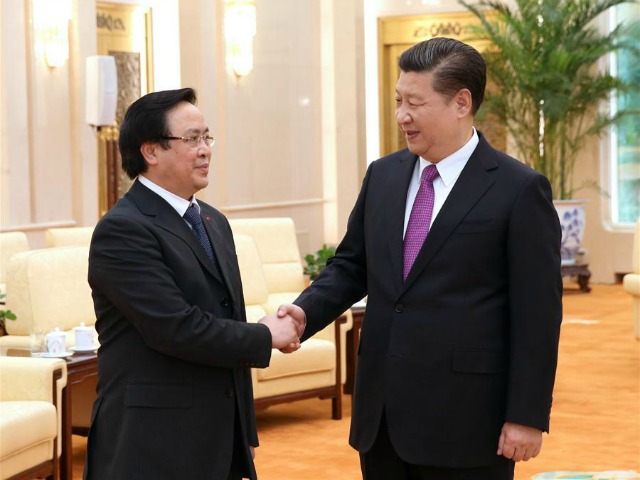Chinese President Xi Jinping welcomed an envoy of the head of the Vietnamese Communist Party, Nguyen Phu Trong, to Beijing this week, urging Vietnam to seek strengthened ties with China after years fighting over territory in the South China Sea have exacerbated tensions between the two nations.
“China and Vietnam share a common destiny, so do the Communist Party of China and the Communist Party of Vietnam,” Xi said in a statement, according to state news outlet Xinhua. While Xi did not explicitly mention the South China Sea, he demanded that nations work on a “comprehensive strategic cooperative partnership” that would allow their relationship to grow in a “sustained, healthy and steady way.”
The envoy, Hoang Binh Quan, relayed a message from Nguyen stating that “developing a stable, reciprocal and cooperative bilateral relationship is both a historical responsibility and a realistic requirement, and is in the fundamental and long-term interests of the two peoples as well.” Nguyen cited their common bond in communism as a paramount reason to maintain good relations.
Despite the topic not being mentioned, Vietnam researcher Pham Nguyen Long posits that the South China Sea dispute triggered the meeting. Before Hoang’s visit, Vietnam sent China a letter demanding it cease its military and construction activities in disputed territory in the region. China claims most of the South China Sea, including the Spratly Islands, which are, in part, Vietnamese sovereign territory. In addition to Vietnam, the nations of Malaysia, Brunei, Taiwan, and the Philippines refute China’s claims to the region. The Philippines has brought the territorial dispute to the Permanent Court of Arbitration at The Hague, where China has vowed to ignore the case entirely.
Earlier this year, satellite images revealed that China had begun constructing more airplane landing strips in the Spratly and Paracel Islands and has placed fighter jets and surface-to-air missiles on Woody Island in the archipelago. Vietnam strongly objected to China’s development of the reefs and islands therein. “Vietnam resolutely protests China’s above-mentioned action, asking China to immediately end while not repeating similar move,” Vietnamese Foreign Ministry spokesman Le Hai Binh said in January.
In addition to developing military facilities in Vietnamese territory, the Chinese government has used ships to attack civilian Vietnamese fishermen who waded too close to the constructions in disputed waters. In 2014, a Chinese vessel sunk a Vietnamese fishing boat in the region, only to later scold Vietnam for allowing the fishing boat to “bring risk to the waters” and threaten an oil rig allegedly near it. A similar incident occurred last October, when a Chinese ship attacked a Vietnamese fishing boat in the Paracel Islands, sinking the boat and leaving the crew to drown. (Vietnamese coast guard officials later rescued them.) The head of the Vietnamese Fisheries Association, Phan Huy Hoang, noted then that “Chinese actions against fishermen from Quang Ngai province have been more aggressive and brutal.”
While Vietnam maintains diplomatic relations to the United States, it remains a communist state and does not enjoy the benefits of being an American ally that nations like Japan and the Philippines do. The United States is bound by treaty to defend Japan from any military belligerence on the part of its neighbors – a fact President Barack Obama reiterated in 2014 when China attempted to set up an Air Defense Identification Zone (ADIZ) in Japanese territory in the East China Sea. The Philippines has also used its alliance with the United States to strengthen its defenses, signing a ten-year deal with America in 2014 that would ensure a U.S. military presence in the region. Lacking any such alliance, Vietnam has remained more vulnerable to attacks such as what Chinese vessels attempted.

COMMENTS
Please let us know if you're having issues with commenting.